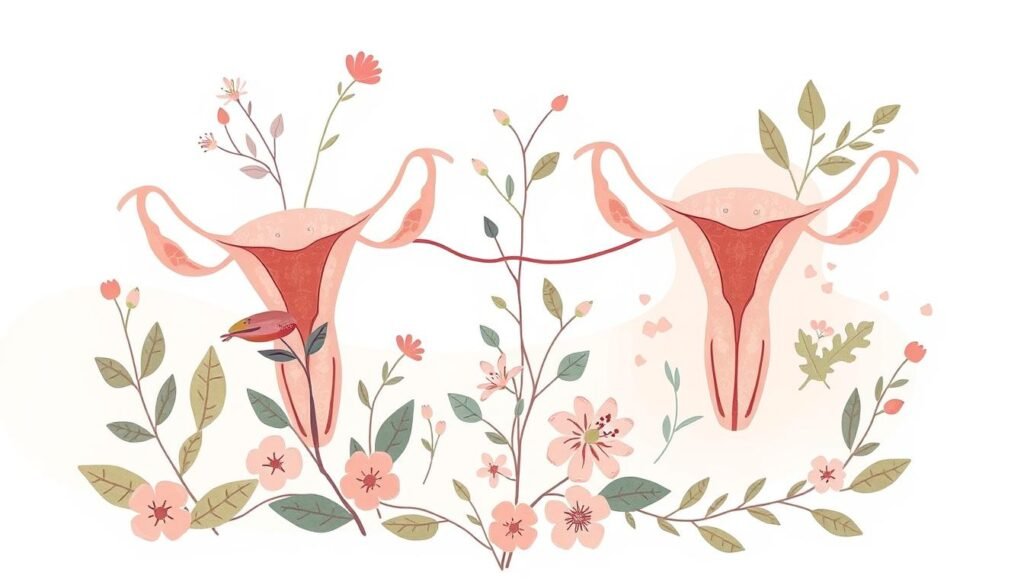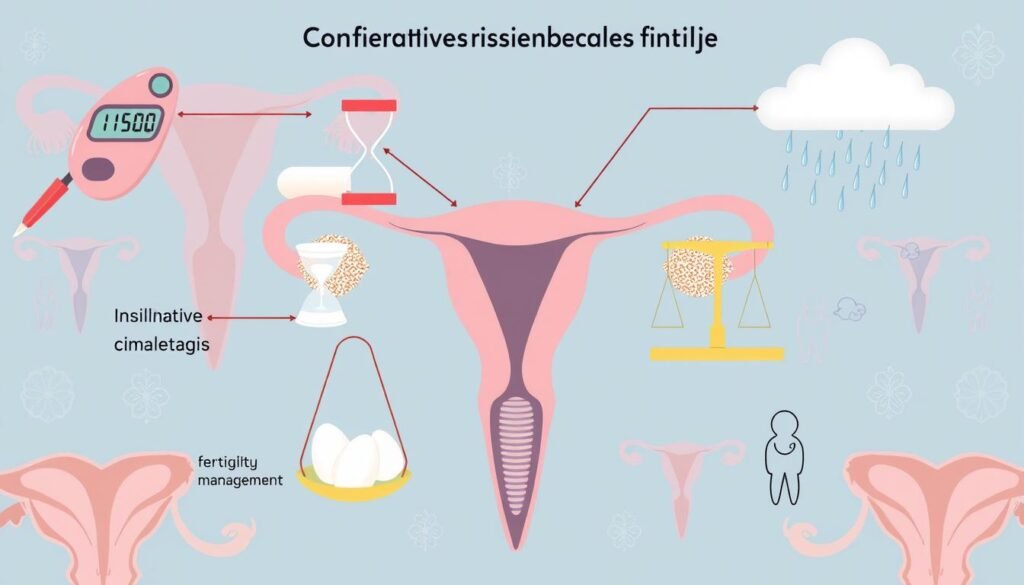Did you know a big number of women, between 2.2% and 26.7%, might have polycystic ovary syndrome (PCOS)? This disorder affects women aged 15 to 44 and comes with a range of issues. From irregular menstruation to the risk of infertility and metabolic problems, it’s big. That’s why knowing about PCOS is key for anyone looking to understand its impact on women’s health.
Polycystic ovary syndrome causes hormone imbalances. These can lead to high levels of androgens, resulting in unwanted hair growth and acne. Plus, many with PCOS have cysts on their ovaries. This problem often starts early, sometimes as young as 11 or 12. It shows why we must spread the word and screen early.
Ignoring PCOS can result in serious health issues like obesity, diabetes, and heart disease. It can also complicate pregnancy. Catching it early and managing it well helps women stay healthy. This lets them deal with PCOS’s many challenges better.
Key Takeaways
- PCOS affects a significant percentage of women, with many remaining undiagnosed.
- Common symptoms include irregular periods, excess hair growth, and ovarian cysts.
- Early intervention can reduce long-term health risks associated with PCOS.
- Understanding the hormonal imbalances related to PCOS is key to effective management.
- Lifestyle changes play a crucial role in alleviating symptoms and improving health.
Understanding Polycystic Ovary Syndrome (PCOS)
Polycystic ovary syndrome, or PCOS, is a common issue for women in their reproductive years. It involves symptoms due to hormone imbalances. Women might have periods that don’t follow a regular schedule.
This problem is often shown by tiny cysts in the ovaries. These cysts are filled with fluid. The body might also make more male hormones. This can cause extra hair growth, gaining weight, and skin problems like acne.
Studying PCOS is key because it is linked to other health issues. A big issue is insulin resistance. This makes the hormonal imbalance even worse. If your family has a history of insulin issues or being overweight, your risk goes up.
Having knowledge about PCOS helps women get the right medical help. They can also make changes in how they live to improve their health. Treatment may include changing what you eat, taking medicine, and living healthier. With more people knowing about it, managing reproductive health gets easier. This lets women handle PCOS better.
Common Symptoms of PCOS
Polycystic ovary syndrome (PCOS) is a complex hormonal issue affecting women’s health. It’s key to spot its symptoms early for better treatment. This condition impacts up to 1 in 10 women worldwide, showing how widespread it is.
Irregular Periods and Their Implications
Irregular periods stand out as a clear sign of PCOS. Some women might see their cycles extend past 35 days or have less than nine periods yearly. Others might not get their period at all. These irregularities hint at hormonal problems that could affect fertility.
About 1 in 10 women with PCOS face challenges in becoming pregnant. This fact underlines the importance of managing these symptoms effectively.
Excess Androgens: What It Means for Women
Having excess androgens is another key indicator of PCOS. This can result in noticeable changes, including hirsutism—unwanted hair growth on the face or chest. It can also lead to problems like acne or hair thinning due to the hormonal imbalance. Tackling these issues can greatly improve one’s life and health.
Causes of PCOS and Hormonal Imbalance
The causes of PCOS are not fully understood but involve many factors. Hormonal imbalance and insulin resistance are key contributors. Women with PCOS often have higher levels of androgens. This leads to symptoms like irregular periods and excess hair growth. Knowing these causes is vital for managing the condition.
Insulin Resistance and Its Role in PCOS
Insulin resistance is common in women with PCOS. This condition makes the body’s cells less responsive to insulin. This results in high insulin levels that may increase androgen production. This aggravates PCOS symptoms. The link between insulin resistance and hormonal issues is crucial for understanding PCOS.
Many factors can lead to insulin resistance, such as:
- Obesity, which raises the risk of insulin resistance and affects hormones.
- Genetic factors that influence insulin sensitivity.
- Issues in the neuroendocrine system, affecting metabolism.
Recognizing insulin resistance is key in addressing PCOS. Prompt action and lifestyle changes like diet adjustments and exercise play a big role. It’s essential to grasp how insulin resistance and hormonal imbalance interact. This knowledge helps improve the lives of women with PCOS.
PCOS Basics: What It Is and How It Affects Women’s Health
Polycystic Ovary Syndrome (PCOS) is a common condition. It affects 5-10% of women in their childbearing years, mainly aged 15-44. About 5 million women in the United States face this syndrome. It’s important to know that PCOS can affect women of all races and ethnic backgrounds.

Many women find out they have PCOS when they have trouble getting pregnant. Irregular periods can be a sign of hormonal imbalances and reproductive health issues. Almost 70% of women with PCOS also have insulin resistance, which affects their quality of life.
Being overweight or having a family history of PCOS, insulin resistance, or type 2 diabetes increases your risk. PCOS can cause more than reproductive problems. Without treatment, it can lead to type 2 diabetes, high blood pressure, heart disease, and cancer of the endometrium.
It’s crucial to be aware and act early. Making healthy lifestyle choices, eating well, and exercising can help manage PCOS. Knowing about hormone treatments and medications like Metformin is key to taking charge of your health.
| Aspect | Details |
|---|---|
| Prevalence | Affects 5-10% of women aged 15-44 |
| Symptoms | Irregular periods, insulin resistance, potential for infertility |
| Long-term Risks | Type 2 diabetes, heart disease, endometrial cancer |
| Management Strategies | Healthy diet, exercise, medications like Metformin |
Getting to know the basics of PCOS is key to recognizing its impact on health and fertility. Early awareness and management can make a big difference in life quality for those affected.
Diagnosis of PCOS: What to Expect
To diagnose PCOS, doctors start by looking at a patient’s medical past. They also do a full physical check-up. A pelvic exam is part of this to look closely at the ovaries. This step-by-step method helps pinpoint PCOS signs and symptoms.
Physical Examination and Medical History
During the check-up, a healthcare provider looks for signs of high androgens. These might show up as acne, hair loss like men, or too much hair. It’s also key to know about the patient’s family health history. This background info can shed light on the symptoms they have.
Diagnostic Tests: Ultrasounds and Blood Tests
To confirm PCOS, ultrasound and blood tests are crucial. An ultrasound is used to check the ovaries for cysts and see how thick the uterine lining is. Often, these scans show ovarian changes in women with PCOS. This helps in the diagnosis.
Besides ultrasounds, blood tests check for hormone levels like testosterone and insulin. They also look at cholesterol and glucose levels. This data is vital for making a treatment plan tailored to the patient.
Treatment Options for PCOS
Managing polycystic ovary syndrome (PCOS) needs a plan that suits your health and goals. This includes lifestyle changes and medicines to ease symptoms and lower health risks.
Lifestyle Changes: Diet and Exercise
Making key lifestyle changes is crucial for PCOS management. Eating whole foods like fruits, veggies, lean meats, and good fats is important. So is staying active through things like walking and weight training. These steps not only manage PCOS symptoms but also cut the risk of serious problems like diabetes and heart issues.
- Balanced Diet: Choose foods with a low glycemic index to control insulin.
- Exercise: Try to get 150 minutes of moderate exercise every week.
- Weight Management: Losing 5-10% of your weight can greatly improve your symptoms.
Medications for Managing Symptoms
There are various medications for PCOS to target specific issues. Birth control pills can make menstrual cycles more regular and lower high androgen levels. They help with skin problems and unwanted hair too. Drugs that make the body more sensitive to insulin are recommended for those with insulin issues. There are also treatments for excessive hair growth and period problems.
| Medication | Purpose | Additional Benefits |
|---|---|---|
| Birth Control Pills | Regulate menstrual cycles | Lower androgen levels, reduce acne |
| Metformin | Improve insulin sensitivity | Aid in weight management, reduce diabetes risk |
| Spironolactone | Reduce hirsutism | Help with acne treatment |

The Link Between PCOS and Infertility
Polycystic Ovary Syndrome (PCOS) is a big deal for women who want to have babies. It happens in about 1 in every 10 women of childbearing age. This condition leads to hormone problems that mess with ovulation. Knowing how PCOS changes ovulation is key to dealing with infertility.
How PCOS Affects Ovulation and Pregnancy
PCOS causes up to 70% of ovulation problems, making it a big worry for those trying to get pregnant. It often leads to irregular periods. This makes it hard for eggs to be released regularly. Women with PCOS might also have a thin uterine lining and thick ovaries. This makes it tough for eggs to implant and ovulate on their own.
PCOS can lead to these issues:
- Irregular periods and missed ovulation.
- Thin uterine lining that stops eggs from implanting.
- Hormone issues, including too much testosterone.
About half to 60% of PCOS women are overweight. Losing just 10% of weight can really help by fixing hormone levels. PCOS also often comes with insulin resistance. This makes the hormone problems worse. Too much belly fat makes insulin issues tougher to handle.
Changing your lifestyle with better diet and exercise is as important as medicine in managing fertility. Drugs like clomiphene citrate can trigger ovulation. Metformin, a diabetes drug, can make insulin work better and help eggs release regularly. For higher chances of getting pregnant, IVF is a good option. It offers the best shot at conceiving each cycle.
It’s crucial to test blood for PCOS. This checks for odd hormone levels, like in follicle-stimulating hormone (FSH) and luteinizing hormone (LH). Custom treatments for each woman with PCOS can make things better. Recent research shows working together globally on PCOS can improve understanding and help where it’s needed most. Learn more about this growing research area here.
Health Complications Associated with PCOS
Polycystic Ovary Syndrome (PCOS) is more than a hormone issue. It brings many long-term health risks. These can greatly affect a woman’s health. PCOS can lead to metabolic problems, raising the risk of diabetes and heart disease.
Long-Term Risks: Diabetes and Heart Disease
About 50% to 75% of people with PCOS have insulin resistance. This issue can lead to obesity, inflammation, and metabolic syndrome. These are risk factors for diabetes. Also, PCOS is linked to inflammation, which can lead to heart disease.
PCOS greatly increases the risk of type 2 diabetes due to insulin problems. Many with PCOS have glucose intolerance, or pre-diabetes. So, regular health checks are crucial for early risk detection and management.
Heart disease is also a major concern with PCOS. Hormone imbalances, obesity, and inflammation raise cardiovascular risks. High cholesterol and hypertension can result from PCOS complications.

Diet management is key in handling these health risks. A Mediterranean diet is often recommended for its anti-inflammatory effects. It focuses on omega-3 rich fish, legumes, whole grains, and veggies. Avoiding saturated fats, processed meats, and refined sugars is vital for PCOS management.
Here’s a comparative overview of dietary choices and their impacts:
| Food Type | Affects PCOS | Recommendations |
|---|---|---|
| Fried Foods | Increases inflammation | Avoid |
| Saturated Fats | Contributes to weight gain | Avoid |
| Refined Sugars | Worsens insulin resistance | Avoid |
| Omega-3 Rich Fish | Reduces inflammation | Include |
| Whole Grains | Stabilizes blood sugar | Include |
| Hydration | Supports metabolic health | Stay hydrated with low-sugar beverages |
Healthy eating, regular screenings, and active management are key for those dealing with PCOS. Balanced meals and understanding these health risks can greatly improve life quality. For more on PCOS, visit the official PCOS booklet.
Living with PCOS: Managing Symptoms and Mental Health
PCOS requires a well-rounded approach to tackle symptoms effectively. Treating visible symptoms like hirsutism and acne is key to improving self-esteem. This enhances life quality. It’s important for affected women to explore treatment options. These options can ease physical discomfort. Treatments like laser hair removal or skin care for acne can offer relief and raise confidence.
Addressing Hirsutism and Acne
Many people with PCOS struggle with hirsutism and acne, affecting 27–49% of them. Sadly, this can lead to depression. Adopting a healthy lifestyle and regular exercise can lessen these symptoms. Adding natural and hormonal treatments can also aid in managing symptoms. Getting advice from doctors and support from groups can empower those dealing with these issues. Learning the full spectrum of symptom management is crucial for women with PCOS.
Impact on Mental Health: Depression and Anxiety
About half of those with PCOS feel anxious, more so than those without it. The link between physical problems, like weight, hirsutism, acne, and mental health, is strong. Early mental health check-ups and social support are vital. Treatment plans may include antidepressants; however, these might cause weight gain. So, balancing treatments is key for good health.
Understanding PCOS’s complex challenges is crucial. Prioritizing mental health and steady support improves both physical and mental conditions. This leads to a healthier, happier life for those impacted.
Conclusion
Polycystic ovary syndrome (PCOS) affects 8-13% of women in their childbearing years. Sadly, up to 70% of these women might not know they have it. This reveals a big need to understand PCOS symptoms like irregular periods, gaining weight, and acne. It’s also crucial to know about the bigger health problems PCOS can bring.
Recognizing PCOS early is vital. The right early treatment can greatly improve someone’s life. This condition is linked to serious issues like type 2 diabetes, high blood pressure, and endometrial cancer. It matters a lot in public health.
Women with family members who have diabetes and those from certain ethnic groups face higher risks. This shows how important specific health management is. Plus, dealing with PCOS’s impact on both physical and mental health is essential. It’s tied to anxiety, depression, and facing negative judgement from society.
Talking more about PCOS helps build a network of support and raises awareness about this important health issue. Public health efforts are aiming to better understand and treat PCOS. It is critical for women with symptoms to connect with healthcare providers and actively manage their health. Finally, education and community support play big roles in lessening PCOS’s impact and enhancing overall health.